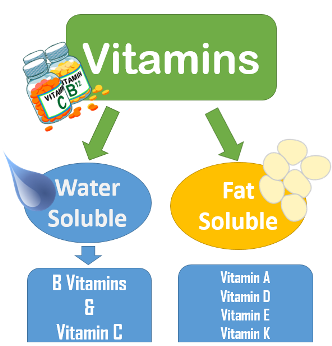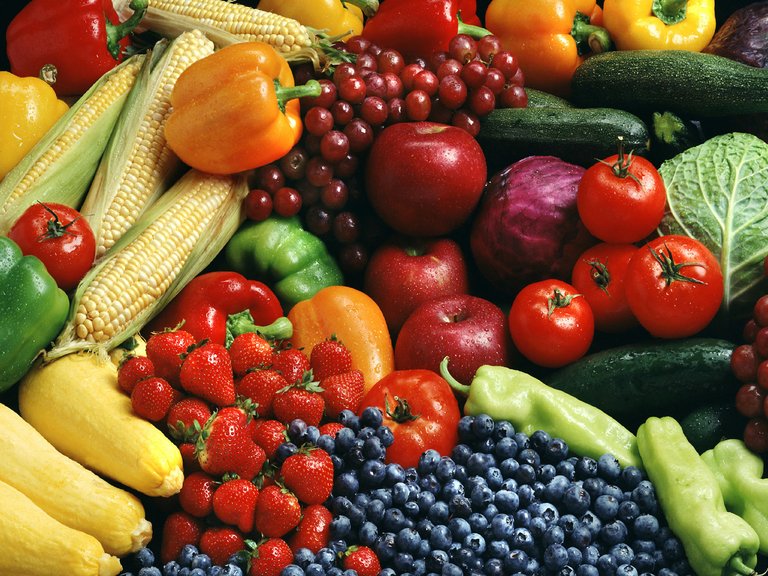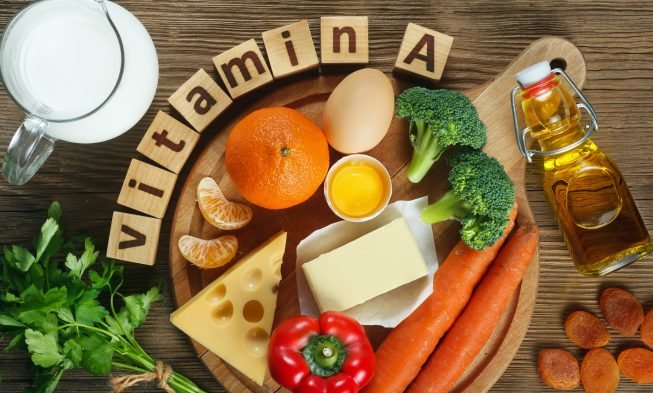
- Carbohydrate
- Proteins
- Fats and oils
- Vitamins
- Minerals
- Water.
Our bodies require certain amounts of these classes of food to stay healthy and function properly. A proper combination of these classes of food, is termed as "Balanced Diet."
Quite a good amount of people are familiar with the functions of carbohydrates and a little bit of protein, however, it may appear that very little emphasis has been placed on vitamins and its uses...
Hence, today, I want to share my knowledge on vitamins, and while I wouldn't want to bore you with excessive scientific terms and jargon, I intend to make this post filled with basic facts about the natural sources of vitamins, deficiencies, functions and why we need them in our body for growth.
What are vitamins, and why do we need to know about them?

Vitamins are super important to the health and well-being of humans in general. That's because they are organic compounds that are required in trace quantities to sustain. This is because the human body cannot provide vitamins for itself (apart from the skin which provides vitamin D when exposed to sunlight on mornings, and some really smart bacteria in the gut can make small amounts of vitamin K), hence, we can only get the daily required amount from the food we eat.
But of course, some animals can produce a particular amount of vitamin they need (Say, dogs, which can produce enough vitamin C for themselves unlike humans), and some vitamins aren't required by every organism.
As an "organic compound," it is evident that vitamins contain carbon as a major constituent. that would explain why our bodies have no clue on how to produce them.
Types of vitamins.
Different vitamins play different roles in the body, and they are classified into two, based on their medium of propagation;
- Water soluble vitamins and;
- Lipid (fat) soluble vitamins
The water soluble vitamins are so called because they could be dissolved in water
and flow in the bloodstream. As such, the body absorbs the needed quantity and the excess could be easily excreted in urines. This outlines the necessity of taking water soluble vitamins frequently as they do not stick around in the body for long.
Unlike its counterpart, Excess fat soluble vitamins can be stored as in the body for a long time (up to six months) till they are required for absorption again.
They can only be dissolved and stored in fat cells, and are transported to areas where they are needed by special carriers in the body.
Generally, there are 13 types of vitamins, all belonging to either of the above classes. Below is an image to illustrate that.

As shown in the image, it's easy to see that the vitamins C (Non B-complex) and B series are categorized under water soluble, and the vitamins A, D, E, and K series fall under fat soluble vitamins.
Briefly, lets get around to exploring these various vitamins and their importance
I'll like to start with water soluble vitamins.
WATER SOLUBLE VITAMINS
As clearly stated, water soluble vitamins don't last long in the body, hence, they are needed everyday to keep up with the requirements of the body.
Vitamin C (Ascorbic acid) --- Clothe up, bro!

Its commonly believed that oranges are the best source of ascorbic acid, however, studies show that fruits such as Guava, Paw-paw and Kiwi fruits contain more vitamin c than oranges. Vegetables such as spinaches and broccoli could also pass for good sources of vitamin C.
Vitamin C helps protect the body from infection, produces collagen (35% of our body proteins is made up of collagen) which accelerates healing processes and reduces skin pigmentation amongst other thing. vitamin C is also useful in the absorption of iron by the body,- a substantial component for carrying blood and in blood cells.
Vitamin C works as an anti-oxidant, and helps protect our cells from free radicals.
It's deficiency in humans include scurvy - An illness that could result in anaemia spontaneous bleeding-, loss of teeth and swelling in some parts of the body.
Vitamin B Complex. --- Legion!
image credits
B classes of vitamins are up to 8 in number. They include;
Thiamine (B1), Which helps the body produce new cells, and aid the breakdown of carbohydrates.
Riboflavin (B2): B2 aids the production of Red blood cells, reduces the risk of heart diseases, and slows down early ageing.
Niacin (B3): Increases the level of "good cholesterol" (High Density Lipoproteins, HDL), which lower the risks of heart diseases.
Pantothenic acid (B5): B5 could be found in almost every food in very small quantities, it is responsible for the breaking down of fats and carbohydrate,and the production of important hormones Eg; testosterone.
Pyridoxine (B6): B6 is a key vitamin in the production of melatonin, serotonin and norepinephrine -- These are sleep and stress Hormones that alter moods.
Biotin (B7): Biotin is commonly referred to as the "Beauty vitamin", as it improves the appearance of the hair, skin and nails.
Folate (B9): B9 reduce the risk of amnesia and depression, and also aids growth in babies.
Cobalamin (B12):B12 is a quite an intriguing vitamin, as it carries out the basic function of making sure other vitamins are adequate and active. it also aids nerve functionality and lowers the risk of heart failure.
Well, 8 in all, as earlier explained. deficiencies of B vitamins could range from anaemia to depression and fatigue amongst all... Some common food sources of B vitamins include cheese, poultry, liver and yoghurt.
LIPID SOLUBLE VITAMINS.
As earlier stated, the excess lipid soluble vitamins are stored in the body till when needed.
Vitamin A. --- Now you see me!

So, on Lipid soluble vitamins, we're starting out with the vitamin "A"... If anything, vitamin A is popularly known for aiding vision and eyesight as it is one of the components of Rhodopsin, - a protein that absorb and detect lights in the eyes-.
Deficiency of Vitamin A typically occurs among children and adults who do not consume an adequate amount of yellow (orange) and green vegetables, fruits and/or liver (cod, beef, pork, poultry). Early weaning from mom can also increase the risk of vitamin A deficiency in infants. Secondary deficiency is associated with chronic malabsorption of lipids. source
It's deficiency could lad to blindness.
The top sources of vitamin A include Spinach, milk and cheese, carrots, meat, fish, butter, eggs, etc...
Vitamin D... Our Sun's gift.

Vitamin D is also known as "Sunshine vitamin", because our skin produces a certain when it is exposed to sunlight. Vitamin D is important for strength and growth in bones, reduces inflammation and aids absorption of calcium.
People who work long hours in a confined space risk a lower level of vitamin D. Deficiency of vitamin D can lead to brittle bones and osteoporosis (A condition where the bones get weak and become likely to break.)
Dairy products like milk, cheese, etc, are an excellent source of vitamin D, as it isn't readily present in foods. Also for those working longer shifts in a confined area, getting Vitamin D supplements would be advisable.
Vitamin E -- Fight fight fight!
image credits

Vitamin E are super important to the immune system in humans. For one, it helps the leukocytes fight off bacteria and prevent infections from getting in, it reduces the risk of Alzheimer's disease and protects the cell from damages by acting as an antioxidant.
Deficiency in vitamin E could lead a lot of complications such as muscle damages, vision weakness, destruction of red blood cells, ataxia, etc...
Some food sources of Vitamin E are mostly fruits, nuts, seeds and vegetables like avocados, as well as fats and oils such as sunflower oil and vegetable oil, egg yolks, nuts, and whole grains.
Vitamin K. --- We are Green!

Vitamin K is another important vitamin that is essential for binding calcium to bones to make it strong.
Vitamin K is important for blood clotting and reduction of coronary diseases. It has also been claimed to slow tumour growth (Even though there isn't sufficient medical evidence to support that claim.) it also helps in treating bleeding and poisoning.
Good sources of vitamin K include foods such as green leaves, kale, spinaches and pumpkin leaves.
CONCLUSION.
In summary, the importance of vitamins to health and well-being cannot be overemphasized, looking at all of the above facts, it could be said that without all of the six classes of food, things could really go wrong as regards health. We'd be skinnier and weaker and all sorts of crazy.
Having said that, it is necessary to follow up on our eating habits and see which areas we might be deficient in. Then we should try to make up for these deficiencies by eating well prepared and balanced dishes from now on
Thank you for reading,
Grow,
STACH is a physical Accelerator Hub dedicated to decentralizing the offline by breaking the barriers to accessing the internet like light, internet and conducive working space.

STACH is supported by @Sndbox as a Sndcastle project.
References.


wow. from what ive read so far, it appears that vitamins have so much to do with our well being, perhaps even more than other classes. but of course all classes of foods are important too. I'd love to see you compare and contrast these classes on here someday. thanks for writing.
@pangoli on patrol...
True. Vitamins are important but other classes are too. High intake of vitamins have their effects on the body just as low intake of other classes have derogatory effects on us. So we have to balance them for good results.
Great article @stach !
Voted and Resteemed.
Vitamins are needed for almost any process our body executes.
One thing that we would like to take into account, is that, the biggest studies made on multivitamins, concluded that in many cases, there were no positive consequences from its consumption.
https://www.hopkinsmedicine.org/health/healthy_aging/healthy_body/is-there-really-any-benefit-to-multivitamins
For this reason, specialist remark that the best source of vitamins will be always in food, this is one of the main reasons a proper and balanced nutritional plan is ideal if we want to achieve a good state of health.
God Bless Us All.
True. A meal plan is necessary as its a way of ensuring we are taking balanced diets. Thank you.
Amazing post sharing so much knowledge and information about vitamins.... eating well and using supplements providing the right minerals and vitamins is important for good health

Good educational information should be shared so your post has been Upvoted and Resteemed. Hope more people get to read your blog.
Thanks @stach.
Check out my latest poem here:
https://steemit.com/poetry/@joebest/e-x-i-t
aww thanks for that! stach very helpful thank you
With love,
harj : ) xoxo
Abstract artist
(My latest artwork is "Government")
Health is wealth... Thanks for the exposition
You just refreshed my mind about high school biology. Thank you @stach
Very informative post on vitamins and diet. Thanks
You know how much it would cost to take all of the sups... just eat some cbd and buy some crypto. Job done !
Lol.. What is a cbd?
Okay. I think you meant sbd... Lol.. Yeah right.
Wow, thanks for this wonderful information.
Well i can say, all foods we takemust contain some sort of vitamins
So in my daily meal, i made sure it contains some greens.
Thank you!
Thank you for reading dear... You should also try fruits too.. Could be quite the adventure, I tell you.
thanks , am sooo resteeming this..
Thought those were M&Ms for a second 😂
Really loved the post! Very informative. I never even knew that Vitamin K existed! Please if you are interested, check out my recent post about Egyptian food and my blog https://steemit.com/life/@saitou/egyptian-food-recipe-how-to-make-basbousa-traditional-egyptian-dish
Vitamin K exists. You can easily get them from the green leaves you eat
great.
Thank you for this brilliant piece you've written @annieben, which confirm that we need vitamins for our daily activities and for good health, but as much as we can we should try to eat food rich in vitamins rather than depending on it's supplement.
You're welcome dear. Personally I believe natural sources are better than the supplements. No refining of any sort.
Thank you very informative and interesting. Brilliant article I really liked read on the lung. Very helpful you fellow! @stach
Thanks for the exposè
Thank you for reading
This is educative....I should watch my vitamins henceforth
Yes you should. Thank you.
very good post
Thanks
Vitamin heal wound faster and helps to prevent infection, nice one from you
One of many reasons why we need them.... Thanks
The body needs vitamin to function. It fights against diseases builds the immune system.
You're right. Thank You.
Vitamin D is very important, on many levels...
It is, "on many levels."
😉
thanks my friend really like your post, because in posting you very much benefit and can add science what else about our body health all. please visit my friend block and upvote my post.
hmm, boss @stach, did you study nutrition? That was great. Free tutor. I did not know you are so good like this in teaching. Natural sources are the best.
Yeah... Natural sources of vitamins are the best. But for those feeling a bit deficient and must catch up, vitamin supplements would do a world of good.
We all need to get our vitamins right
Very informative
A Great Post!
Really like the main photo of the vitamins! Really full of colorfull!
Very important.
Thank you bery much for sharing. I feel healthy 🙃
Great information about vitamins.
This is the first information am getting on Steemit.
Nice